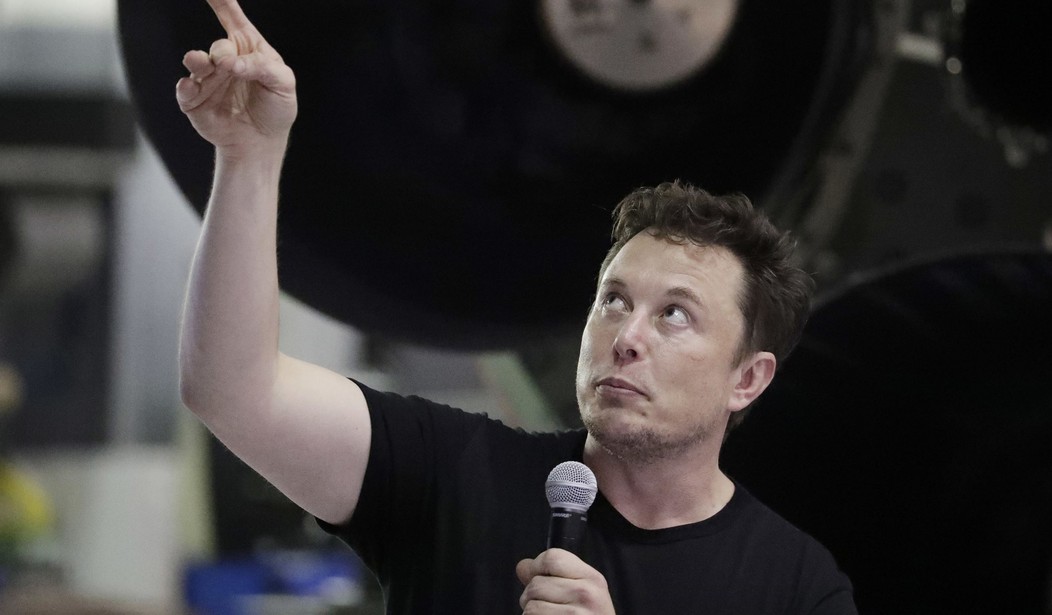So much for saving the planet, eh? When Elon Musk used his superpowers to expand the electric-vehicle market and pressure other automakers into investing in them, Musk was cool enough to get a guest-hosting gig on SNL. Less than a year later, Axios now describes him as a “movie supervillain” for, um … buying Twitter. Or at least trying to do so.
Talk about meltdowns:
Why it matters: The world’s richest man — someone who used to be compared to Marvel’s Iron Man — is increasingly behaving like a movie supervillain, commanding seemingly unlimited resources with which to finance his mischief-making.
The big picture: Elon Musk has decided he wants to take Twitter private at $54.20 per share, assuming he can get “anticipated financing” in place.
In a 138-word offer letter to Twitter board chair Bret Taylor that includes the words “I” or “my” 11 different times, Musk writes that “Twitter has extraordinary potential. I will unlock it.”
Axios isn’t the only one panicking at the thought of a billionaire buying out other billionaires. Our pals at Twitchy have at least two threads running on the reaction from blue-check-certified media professionals who have invoked the Weimar Republic along with government seizure of private capital in order to, er, protect liberty. Or something. Here are a couple of highlowlights:
Elon Musk is why to abolish billionaires.
Asking them to chip in their fair share isn’t enough. Regulating them isn’t enough.
When people are allowed to acquire this much concentrated influence, they will inevitably manspread economic power into every other form of power.
— Anand Giridharadas @ The.Ink (@AnandWrites) April 14, 2022
Today on Twitter feels like the last evening in a Berlin nightclub at the twilight of Weimar Germany.
— Jeff Jarvis (@jeffjarvis) April 14, 2022
To the trolls:
I decided directing my tweet solely to Twitter's CEO was an oversimplification, so I deleted it.
I stand by the underlying sentiment: Elon Musk's attempted takeover of Twitter is a threat to the free world.
I care about freedom — and, also, factual precision. pic.twitter.com/RnriZ7D4pj
— Matthew Rozsa (@MatthewRozsa) April 14, 2022
All of this ignores the fact that Twitter has been controlled by billionaires for years already. So has Facebook, for that matter, and Google/Alphabet, and Yahoo before that. How about the Washington Post, which got acquired by superbillionaire Jeff Bezos, including all of its news reporting functions? Furthermore, the social-media billionaires spent the last few years actively impeding free speech and news reporting rather than encouraging free and open debate. Where was all the rending of garments and gnashing of teeth over that, and all of the apocalyptic nonsense of the last few hours?
There’s actually an answer for that, Before we get to it, let’s lead up to the point with this trenchant observation from Axios. Why will this corporate takeover get waaaaayyyy more coverage than others? Because it’s personal to journalists:
You’re going to hear much more about this bid than you would about a normal proposed M&A transaction, in large part because Twitter is where journalists congregate and do a lot of their work, and they really don’t want to be working in Elon Musk’s private playpen.
That’s part of the reason, but not all of it. The full answer is that these same figures who never bothered to object much to the status quo of social-media control liked the environment that those billionaires created. Those billionaires, they discovered, were malleable and could be either convinced or manipulated into imposing the speech codes preferred by these journalists. Musk, on the other hand, wants to buy Twitter and take it private for the express purpose of thumbing his nose at such pressure — and their ability to control narratives will suffer as a result.
That’s why we will “hear much more about this bid than you would about a normal proposed M&A transaction.” And that’s why the coverage and the commentary will all paint Musk as some sort of Syndrome or Vector, in hopes of amassing enough capital — political and financial — to thwart his buyout. Assuming, of course, that Musk actually can pull this buyout off.
And all of this will tend to overshadow some real concerns about media consolidation that would not just apply to Twitter, but also to the outlets that employ many of those setting their hair on fire over Musk. It’s not unfair to ask what the impact of having the world’s richest man take full control of a social media outlet with Twitter’s reach. It’s also not unfair to ask what the impact has been of Jeff Bezos acquiring the Washington Post, Carlos Slim taking a big chunk of the New York Times, or the M&A of Hollywood studios, acquisitions by Viacom, Comcast, and so on. In terms of real impact on reporting, Musk’s buyout of Twitter would pale in comparison to real media consolidation over the last couple of decades.
And yet the journalists that operate in that sphere barely comment on those concerns while treating Musk as a “movie supervillain.” Watch the media spaces to see how far the conformity of that characterization will spread over the next few days in order to grasp just what the real problem in media actually is.








Join the conversation as a VIP Member